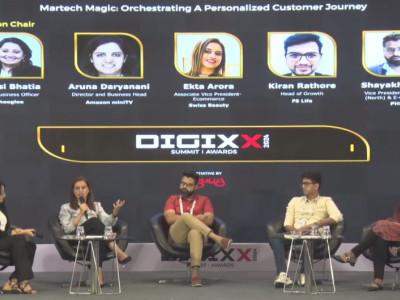Why Booking.com is betting big on sports tourism
In this exclusive conversation with Adgully, Santosh Kumar, Country Manager - Indian Subcontinent & Indonesia, Booking.com, the Official Accommodation Partner for the ICC Men’s World Cup 2023, speaks at length about the tourism opportunities arising out of sporting events around the world, Booking.com’s strategic support for mega sporting events, the collaboration with the ICC Men’s World Cup 2023, this year’s campaign for the event, and the overall marketing plans that promise to make the ICC a remarkable experience for fans and travelers alike.
Could you share with us the significance of the relationship between sports and tourism and how they complement each other in captivating the hearts and minds of travelers and sports enthusiasts?
That’s a good question. For us at Booking.com, we have undertaken a mission that says we want to make it easier for everyone to experience the world. Traditionally, we’ve been investing pretty heavily on the digital marketing side. But in the last few years, we’ve also been investing quite a bit on the brand marketing side as well. For us, sports is one area that we feel has a lot of power to inspire and bring consumers to see and experience the world. When it comes to our sports-related investments – in the US, we’ve been doing Super Bowl ads. We have sponsored Major League Baseball in Europe. We’ve done the UEFA Soccer League for the last few years. This year, we also sponsored the FIFA Women’s World Cup, which happened in Australia. We have an ongoing partnership with the International Cricket Council, where we have come on board as their official accommodation partner for all ICC events during the last five years.
Sports has seen a significant increase in people traveling for experiences. It could also be that COVID has accelerated that trend. But, in general, we’ve been seeing that when sports events happen, they tend to benefit the destination as a whole, because there is increased economic activity, both from a domestic perspective and also from an inbound perspective for nationalities who are coming into the country. It’s stimulating a lot of additional business for local suppliers, who are based in some of those destinations. It is also allowing destinations around the main destination to benefit from some spillover traffic. So overall, there are benefits. It’s a win-win situation all around. And that’s the reason why we are making some big bets on sports tourism.
Booking.com has been actively involved in supporting mega sports events. Please elaborate on the strategies and objectives behind the involvement, particularly in the context of the ICC Men’s World Cup 2023.
I think when it comes to cricket, firstly, cricket is a global platform that has unprecedented reach. I think only the FIFA World Cup and Tour de France offer comparable audiences. And we are a company that has a tremendous amount of choice when it comes to accommodation supply and travel supply across the board in close to 200 countries where we are present. So, I think it’s a great opportunity for us to bring our offerings with what the fans are looking for. And for us, when you think about why cricket and why ICC and why it’s an incredible sporting and cultural event, it’s a great opportunity for us to engage with our consumers. And what we are doing is, as the official accommodation partner for the ICC, we have an integrated marketing campaign, where we have three global ambassadors. We have Rohit Sharma, who’s the Indian cricket captain. We have Joss Butler, who’s the captain of the England team, and we have Glenn Maxwell, who’s the Australian all-rounder. With them, we’ve done an integrated marketing campaign and we’ve shot a TV commercial, which is going to air on all the official broadcast channels. It’s going to showcase the ease of booking with us and also the great supply that we have available, the ease of discovery through the platform.
In addition to that, we are also doing an event where we have former Indian cricketer Zaheer Khan, and we have actor Varun Dhawan joining us to celebrate cricket and travel together. So, through these campaigns, we are looking at both digital presence and we are also looking at in-stadium presence. We are also looking at TV commercials in all of the broadcast channels, etc. We are hoping that with this kind of all-around impact, we’ll be able to capture the eyeballs of the Indian consumers.
This year’s campaign for the ICC Men’s World Cup is highly anticipated. Could you provide some insight into the key themes and strategies driven by the campaign and how it aims to engage with fans and travelers alike?
The idea is for us to cater to various demographics within India, and today, Indians are consuming sports across different channels. Some are looking at it online, some are looking at it on OTT platforms, and some are looking at it at the stadium. A lot of fans are attending the event, and a lot of fans are also looking at it through digital broadcasters, like Star Sports or others. The idea is for us to be present across all of these mediums and for us to be able to engage with the consumers in all of these channels. That’s why we are doing a very integrated all-around marketing campaign.
Could you outline the marketing plans in place to enhance the experience of cricket enthusiasts and travelers during the ICC tournament?
What I can tell you is about the aims that we have. One is that this campaign showcases our commitment to making travel easier, more accessible and enjoyable for people across the board. We have something called a ‘connected trip strategy’, wherein we have not just accommodation – which has traditionally been our strength – but, we have now introduced flights, we have cars, we have experiences across the board for somebody who is traveling to see the cricket World Cup. We want to make sure that they have an end-to-end experience and that they are able to book and manage everything through one platform, and are able to find these incredible places to stay in and incredible experiences to have during the course of the tournament. That is the main objective that we want to achieve through this campaign and how it fits into the ICC Cricket World Cup.
Could you share an overview of your role and responsibilities as the Country Manager for Booking.com in the Indian subcontinent and Indonesia?
I take care of the business in the Indian subcontinent, which includes India and some of our surrounding countries, Maldives, Sri Lanka, etc., as well as Indonesia. I take care of all of our commercial operations in all of these markets. When it comes to managing our entire supply and our partnerships, effectively, anything that leads to the growth of our business in any of these markets sits with me.
How do you approach the market expansion growth strategy for the driver market landscape of India and Indonesia?
For us, India is a priority market. We’ve made a lot of investments here. We continue to be very positive about the growth potential of India. For instance, this year, we’ve expanded our language offerings on our website and our app. So, Hindi is the 46th language that we launched. It’s available to our partners as well as to our consumers. Today, if you as a consumer prefer to discover and book in Hindi, you have the option to do that on our platform. Secondly, we’ve started an Instagram handle this year. We want to be more locally relevant to the Indian consumer. Therefore, we want to run more local campaigns. We want to cater more to the Indian bookers, not just in the metro cities, but also beyond in Tier 2 and Tier 3 cities. There is a big focus also on the supply aspect.
The marketing investment that we’re making for the ICC is a big investment. From an Indian perspective, it is very apt because, in India, cricket is almost like a religion. So, with all of these things, we are hoping that this will continue to pay dividends for us in the years to come, because I anticipate that we will do even more for the Indian market in 2024 and beyond.
Could you highlight any significant trends or changes in the travel and hospitality industry that have impacted your approach to business in these regions?
I can talk to you about a few trends. First is the Travel Confidence Index. After surveying thousands of travelers all over the world, including in India, we found that Indians came out as the most confident to travel and explore the world again in 2022. Coming out of COVID this year, out of all of the countries that were surveyed, India was No. 2, and is still exhibiting a very high confidence level in terms of traveling and seeing the world.
Second is the rise of experiential travel. More and more Indians are seeking interesting, diverse experiences when they travel. They want to go to off-the-beat kind of destinations. They want to do things that are off the grid. In some of the surveys that we’re doing, spiritual tourism is more popular than ever. I know, Indians always travel for spiritual reasons, but this continues to grow quite significantly. We’ve seen a lot of destinations like Varanasi, Rishikesh, Amritsar, Puri grow significantly, both in terms of supply and also in terms of demand. In both situations, there has been a great increase in all of those cities.
We are also seeing emphasis on sustainability. Responsible tourism is another trend that I will talk about. Indians, in general, now want to stay in more sustainable places and have more sustainable experiences. But then there’s a bit of a dichotomy because today, while people want to travel more sustainably, they’re not able to find options necessarily that are sustainable. Discovery is a bit of a challenge, and that’s where we are trying to solve it because we have a certification program that allows properties to list themselves as sustainable and help consumers find these options when they travel. So, sustainability is a very interesting trend to watch out for.
Another trend I will highlight is the alternate accommodation trend. There has been an increase in the supply of alternate accommodations – when I say alternate accommodations, it means anything that does not fit into the traditional hotel segment. As a platform today in India, we offer about 14 types of alternate accommodation – everything from villas, beach houses, camps, tree houses, and all kinds of unique accommodations. So, we are seeing quite a bit of an increase in that. People want to have unique experiences when they travel, and they are more willing to experiment.
As we know, Booking.com operates in a highly competitive market. What are the unique strategies and employees to stay ahead of the competition?
In general, travel is competitive because you have online and you have offline as well. And both are also competing with each other. What's helped us, I think, is there has been a significant increase in the share shift from offline to online that has happened over the last few years. Of course, the Pandemic accelerated it, but in general, also, it was happening even before the Pandemic. In general, we continue to focus on a couple of things. One is the convenience that we offer our consumers, right? Today, when you come on to our platform, we want to make it very easy for you to book whatever you need. Whether it's a flight or a car or a hotel or an experience, right? In just a few clicks. We want to help you discover a lot of options, personalize it to what you want as a consumer, and then help you book it so that flexibility and convenience for the consumer are the two things that we are focusing on more and more. Right. And that's our strategy. I would say keep it simple and make sure that the consumer finds whatever they want when they come onto our platform. And like I said earlier, our mission is to make it easier for everyone to experience the world. So, we want to continue to stay true to the mission that we have as a company.
Could you discuss any challenges or obstacles you have encountered in these markets, and how do you overcome that?
Challenges are a part and parcel of business and life in general. If we didn't have challenges, I wouldn't have a job. So, it's something that we deal with every day, I think. When we think about business-related challenges, it can come from various fronts. It can come from the core business operations that you have. It can come from partners or customers. It can come from the environment around you. It's a very evolving space. Right. I think, in general, what I would say is India offers a lot of opportunities. So sometimes it's great to see how, for instance, there's an evolution in, for example, the fintech space. When you think about payments in general, the adoption that we are seeing in the market, both in terms of partners as well as consumers, the rise of UPI, all of that is fantastic news for the country. So, I would say we tend to focus more on what is the opportunity that it brings. And I think as far as that is concerned, it's unlimited at the moment from an Indian perspective.


















Share
Facebook
YouTube
Tweet
Twitter
LinkedIn